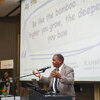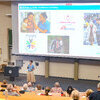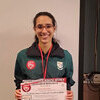UCT awarded two new SAMRC extramural units
30 August 2022 | Story Helen Swingler. Photos South African Medical Research Council. Read time 9 min.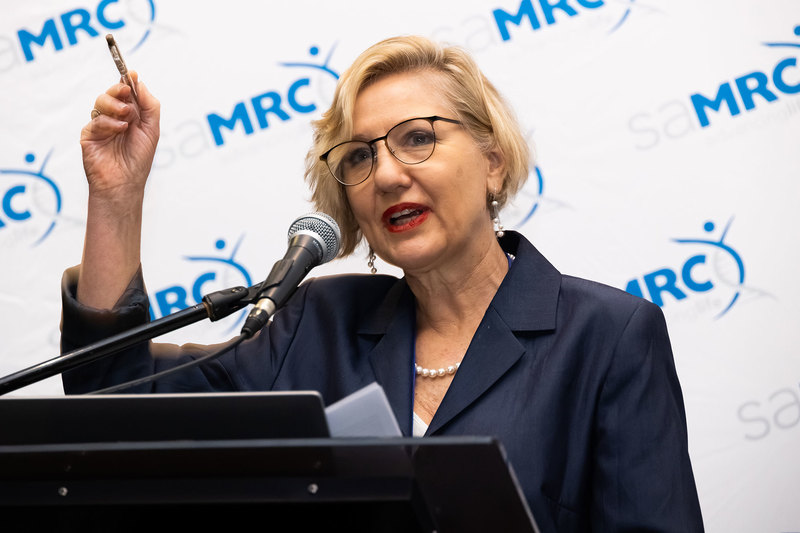
Two of four newly launched South African Medical Research Council (SAMRC) Extramural Research Units (EMUs) to develop critical health research have been awarded to the University of Cape Town (UCT). The units, led by top African researchers, will strengthen the country’s health systems and counter diseases and pandemics such as COVID-19.
UCT’s Professor Ntobeko Ntusi is the director of SAMRC/UCT Intersection of Noncommunicable Diseases and Infectious Diseases Unit. Colleague, Professor Collet Dandara is the director of SAMRC/UCT Platform for Pharmacogenomics Research and Translation Unit.
Unit directorships were also awarded to Professor Refilwe Nancy Phaswana-Mafuya of the University of Johannesburg (UJ) and Professor Pascal Bessong of the University of Venda (UNIVEN). Professor Phaswana-Mafuya heads the SAMRC/UJ Pan African Centre for Epidemics Unit and Professor Bessong heads the SAMRC/UNIVEN Antimicrobial Resistance and Global Health Research Unit.
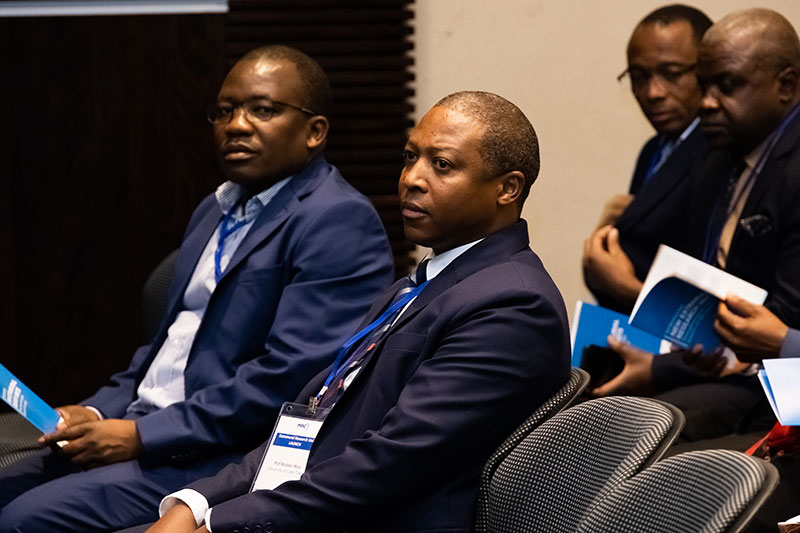
Research and development crucial
The four new units extend the SAMRC’s many interventions in key areas of health, expanding and complementing the SAMRC’s existing 24 EMUs (established within universities) and the 11 intramural research units (established within the SAMRC).
“We wanted to look forward to what the world’s going to look like in the next 10 to 20 years.”
Speaking at the launch in Johannesburg on 22 August, SAMRC president and chief executive officer, Professor Glenda Gray, said the deadly COVID-19 pandemic had highlighted the crucial role of research and development in the health sector.
“When we looked at our choices for extramural units, we wanted to look forward to what the world’s going to look like in the next 10 to 20 years and position the SAMRC to not only respond to the diseases of the past and present, but to pivot to the future … to be prepared for future pandemics and work towards making South Africa resilient.”
Each of the four new unit directors is a recognised black African researcher who has made outstanding scientific contributions to advancing science and building the knowledge base in their disciplines, Professor Gray said.
The launch comes at a critical point of the SAMRC’s Strategic Plan 2021/21–2024/25 implementation, Gray added. Importantly, the units will also support the Department of Health’s Outcome 2 of the Negotiated Service Delivery Agreement: “A Long and Healthy Life for All South Africans”.
The launch was also attended by high-level representatives of the medical research community and government health department.
Nexus of non-communicable diseases and infections
Professor Ntusi’s SAMRC/UCT Intersection of Non-communicable Diseases and Infectious Diseases Unit will enhance the understanding and management of the interaction between endemic infections such as SARS-CoV-2, HIV and tuberculosis, and non-communicable diseases such as heart failure, hypertension, diabetes mellitus, obesity, cancer, and mental health.
Speaking at the launch, Ntusi, who is the head of the Department of Medicine at UCT and Groote Schuur Hospital, said that non-communicable diseases and infections often co-exist in individuals and manifest in intricate ways. An example is heart failure and hypertension in those with COVID-19.
“To improve our understanding of the management of that intersection of infections and NCDs we must have a systematic approach.”
However, the approach to understanding the managing of this complex nexus has been siloed, he said. This has limited opportunities to study the interaction of non-communicable diseases and infections and siloed approaches to research and clinical practices.
“We must have a systematic approach,” said Ntusi. “This will allow us not only to better understand mechanisms of disease but will ultimately lead to better management of individuals that suffer from both, particularly those in low- and middle-income countries.”
He added, “The EMU will drive a new area of scholarship, generate new knowledge and a new generation of scientists and associations that will improve the health of those who suffer from these significant public health conditions.”
The new initiative will also bring together scientists from fields as diverse as imaging, basic science, immunology, public health and clinical disciplines.
“My hope is that this will give us the ability to leverage all this expertise to create much greater impact in terms of the work we do.”
In his thanks, Ntusi also paid tribute to the “outstanding contributions” of students, collaborations with staff in the unit, and “extraordinary support” from the Research Office executives, Deputy Vice-Chancellor for Research and Internationalisation Professor Sue Harrison and Executive Director Dr Linda Mtwisha, as well as the Faculty of Health Sciences.
Pharmacogenomics and precision medicine
Professor Dandara’s SAMRC/UCT Platform for Pharmacogenomics Research and Translation Unit will identify inherited genetic variations, epigenetic changes and the microbial profiles associated with interindividual differences in the ways patients respond to therapeutic treatment. This includes herbal medicine.
The effects of pharmacogenomics, the intersection of genetics and pharmacology, play a large role in therapeutics, Dandara said at the launch. Dandara heads up the UCT Pharmacogenomics and Drug Metabolism Research Group (PharmGx).
Patients may present the same conditions and symptoms but underlying genetic data means they show differential responses to the same treatment. This means that a drug produced in one part of the world does not work in the same way in another part of the world. Drug studies on African populations and those of non-African origin in Europe, for example, had demonstrated this.
“We are interested in screening the specific genomes that affect drug responses. We must study this to prevent toxic effects and drug inefficacy in certain populations,” Dandara said.
“What we are interested in is screening the specific genomes that affect drug responses.”
Dandara said that pharmacogenomics could be used to tailor medications for specific populations. In the future, pre-emptive, one-off testing could become routine among patients. This could dramatically reduce their chances of adverse reactions to prescribed medications.
For this to become a reality, however, many more pharmacogenes in African populations must be characterised. Here capacity building is key, he said.
At UJ, Phaswana-Mafuya’s unit will focus on better understanding current pandemics through cutting-edge pan-African and global research, epidemiological and public health studies among marginalised populations in diverse, low-resource settings in South Africa, sub-Saharan Africa and globally.
And at the UNIVEN, Bessong’s unit will conduct research on microbial, human and environmental determinants of the acquisition and transmission of antimicrobial resistance. The unit collaborates with community and policymakers to enhance our understanding of the dynamics of antimicrobial resistance for improved antimicrobial resistance stewardship.
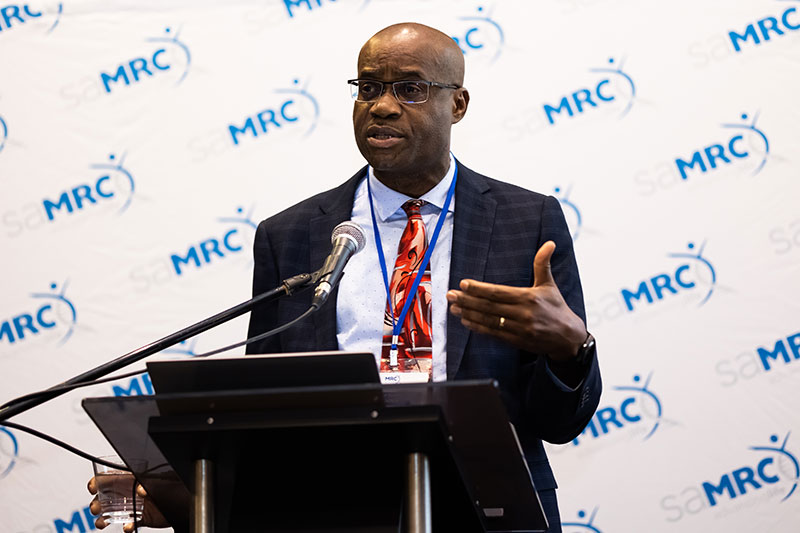
Build skills, capacity
Preceding the launch, keynote speaker, Professor Kelly Chibale, said that the new EMUs would empower and promote high-level research in South Africa. Essential to this are capacity building and skills.
Professor Chibale is the Neville Isdell Chair in African-centric Drug Discovery and Development at UCT, the director of H3D, UCT’s drug discovery and development centre, and the director of the SAMRC/UCT Drug Discovery and Development Research Unit.
Citing his own experiences in developing research in drug discovery and development, Chibale said it is critical to identify, develop, train, and retain talent and skills in the leaders that will advance science.
Here job creation is essential.
“Science is not always about just delivering products. It’s also about using science for development to create jobs and providing hope and inspiration to young people.”
 This work is licensed under a Creative Commons Attribution-NoDerivatives 4.0 International License.
This work is licensed under a Creative Commons Attribution-NoDerivatives 4.0 International License.
Please view the republishing articles page for more information.
Research & innovation



